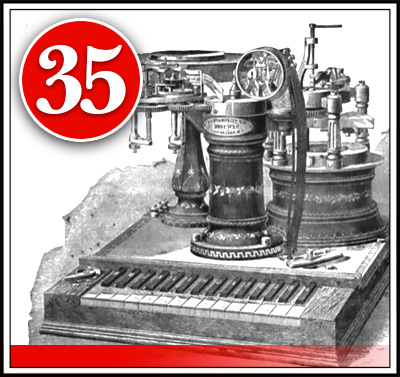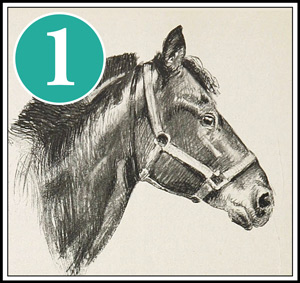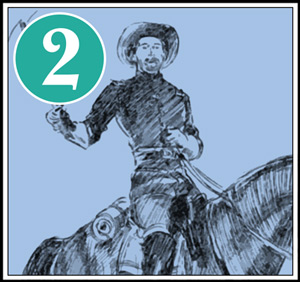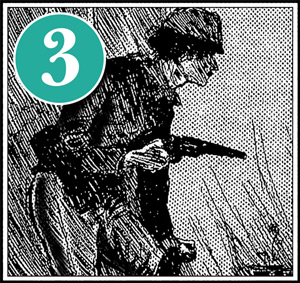
Telegraph Talk and Talkers
Episode 35
In its written form telegraphese, or “Morse,” as it is called in the vernacular, is rarely seen. Yet as a vehicle of expression it is, to the initiated, as harmonious, subtle, and fascinating as the language of music itself.
Podcast: Play in new window | Download
Subscribe: Apple Podcasts | Email | TuneIn | RSS

Telegraph Talk and Talkers
by L. C. Hall
CROSS the threshold of the operating department of a metropolitan telegraph office, and you pass into a wonderland where much is done that might well excite astonishment if the vernacular in which it is transacted were set down in comprehensible phrase. Here men talk of megohms and microfarads and milliampères; you carelessly touch a bit of brass and are stung by an invisible imp; you see a man gazing fixedly at an impertinent little instrument, toying idly the while at a rubber button, and the brass instrument having clattered back, you see him laugh idiotically for no reason whatever.
For “telegraphese” is a living, palpitating language. It is a curious kind of Volapuk, a universal tongue, spoken through the finger tips and in most cases read by ear. In its written form telegraphese, or “Morse,” as it is called in the vernacular, is rarely seen. Yet as a vehicle of expression it is, to the initiated, as harmonious, subtle, and fascinating as the language of music itself.
Nothing could be simpler than its alphabet of dots and dashes. Yet it has come to pass that out of the manner of rendering this simple code has been evolved a means of communicating thought and feeling rivaling in flexibility and scope the human voice.
A great hall was filled one night with people, mostly telegraphers and their friends. On the stage were a dozen men, a few tables upon which were sets of shining telegraph instruments, and a number of pen writing machines of different patterns. The occasion was a “fast sending tournament,” held to establish records in rapid transmission.
CHARACTER READ BY DOTS AND DASHES
One by one the contestants stepped to the test table, and manipulated the key. There was a tense stillness throughout the hall, broken when “time” was called by a trill of metallic pulsations read by most of the audience as from a printed page. The text of the matter is of no concern, an excerpt from a great speech, a page of blank verse, or only the “conditions” found at the top of a telegraph form. Speed and accuracy alone are vital. Forty, forty-five, fifty words a minute are rattled off seven hundred and fifty motions of the wrist and still the limit is not reached. The contestants show the same evidences of strain that characterize the most strenuous physical contest — the dilating nostril, the quick or suspended breathing, the starting eye.
Presently a fair-haired young man takes the chair, self confidence and reserve force in every gesture. Away he goes, and his transmission is as swift and pure as a mountain stream. “To guard against mistakes and delays, the sender of a message should order it repeated back.” The audience, enthralled, forgets the speed, and hearkens only to the beauty of the sending. On and on fly the dots and dashes, and though it is clear that his pace is not up to that set by the leaders, nevertheless there is a finish — an indefinable quality of perfection in the performance that at the end brings the multitude to its feet in a spontaneous burst of applause; such an outburst as might have greeted a great piece of oratory or acting.
A REBEL BETRAYED BY HIS SOUTHERN ACCENT
A telegrapher’s Morse, then, is as distinctive as his face, his tones, or his handwriting and as difficult to counterfeit as his voice or writing. Of this individual quality of telegraphese, the old war telegraphers tell many stories. A Confederate, for example, encounters on the march, a line of wire which he suspects is being used by the enemy. He taps the wire, “cuts in” his instruments, and listens. His surmise is correct; he “grounds off” one or the other end, and, trying to disguise his style of “sending,” makes inquiries calculated to develop important information. But the Southern accent is recognized in his Morse by the distant manipulator, who, indeed, may have been a co-worker in the days “before the war.” So the intruder gets only a good humored chaffing. “The trick won’t work, Jim,” says the Federal operator. “Let’s shake for old times’ sake, and then you ‘git’ out of this.”
In the wire world a telegrapher is known by his “sign” — it may be the letter X or Q or &. Now there is certainly nothing in a mere letter to warm up to, or the reverse; and yet, after a day or two of this wire acquaintance with a man whom one has never seen, and whose name one does not know, a conversation, mind you, not of your own, but of exchanging other persons’ telegrams, one gets an idea of the other’s personality as distinct as if there had been personal intercourse; one feels friendly toward him, or dislikes him. And one’s own feeling toward him is probably shared by every one who has had this wire contact with him. X or Q or & may thus stand for a distinct personality in the telegraph world, in the same sense that the name Thackeray or Longfellow stands for an individuality in the literary world.
A LAUGH ON THE WIRE
Expressed in print a laugh is a bald “ha ha!” that requires other words to describe its quality. In wire talk the same form is used, but the manner of rendering it imparts quality to the laughter. In dot-and-dash converse, as in speech, “ha! ha!” may give an impression of mirthlessness, of mild amusement, or of convulsion. The double “i,” again, in wire parlance, has a wide range of meaning according to its rendition. A few double “i’s” are used as a prelude to a conversation, as well as to break the abruptness in ending it. They are also made to express doubt or acquiescence; and in any hesitation for a word or phrase are used to preserve the continuity of a divided sentence. When an order is given in Morse over the wire, the operator’s acknowledgment is a ringing “ii!” which has the same significance as a sailor’s “aye, aye, sir!”
The man would be put a poor observer of little things who, after working a wire with a stranger at the other end for a week, could not give a correct idea of his distant vis-a-vis disposition and character. And it would be quite possible for an imaginative operator to build up a fairly accurate mental image of him, whether he ate with his knife, or wore his hat cocked on the side of his head, or talked loud in public places.
A FRIENDSHIP FORMED BY WIRE
Some years ago, in a Southern office, I was assigned to a “circuit” which had its terminus at the national capital. My fellow operator at the other end of the wire used the letters “C G” for his wire signature.
C G’s Morse was so clear, even, and rhythmic, his dots and dashes so perfectly timed and accurately spaced, that I immediately conceived a cordial liking for him. In a short time this liking, to which he heartily responded, ripened into a strong and sincere attachment. My friend’s distinct though delicate wire touch made working with him exceedingly restful. Indeed, every day for months I “received” from him without perceptible fatigue, or the necessity of “breaking.” Almost from the beginning of our acquaintanceship I fancied that I should know him at sight if I chanced to meet him. I pictured him a tall, frail man, with the refined and patient manner of one who has suffered much, his features delicately molded, his eyes of the kind that kindle quickly when lighted by a smile, and his mouth ready to apply the torch whenever his sense of humor prompted. I fancied that I should know his dress, the old fashioned collar; the small white tie; the thin, rather long, black sack coat.
Some months after our first meeting by wire, I was called to Washington, and while there I visited the big operating room of the main office, in order to greet the many friends of other days. As I made my way about, I kept a sharp lookout for my old wire friend. I did not ask to have him pointed out, because I wished to see if it were possible to identify him by my mental photograph. Presently I spied him, just as I had pictured him. I stood beside him for a moment; then, touching his shoulder, I held out my hand.
“How do you do, C G? I am very glad to see you and to have the pleasure of shaking your hand.”
Though he was a much older man than I, there was no lack of respect in my words, for it is not uncommon for one telegrapher to address another by his “sign.”
C G rose with a quiet dignity, and taking my hand looked down at me over his glasses, his eyes beaming. “It’s H, is it not? I am very glad to meet you, my son!” And then we fell to chatting, face to face, as we had so often done by wire.
I never met him again in the flesh. A few months after my Washington visit I missed him from my wire. In response to an inquiry I was told that my dear old friend had been seriously injured in a cable car accident, and that being alone in the world he had been taken to a hospital for treatment. There he lingered a while, at times half conscious; then his gentle spirit went out.
I made another trip to Washington, to attend his funeral; afterward making a visit to the hospital to hear from the head nurse the story of his injury and death.
“Late in the evening,” said the good woman as our interview was ending, “I was called into his room. He was rapidly failing, and was talking as if in a dream, two fingers of his right hand tapping the bedclothes as if he were sending a message. I did not understand the purport, but perhaps you will. ‘You say you can’t read me?’ he would say; ‘then let H come to the key. He can read and understand me. Let H come there, please.’ Now and again his fingers would cease moving, as if he were waiting for the right person to answer. Then he would go on once more: ‘Dear me, dear me, this will never do! I want to talk with H. I have an important message for him. Please tell him to hurry.’ Then would follow another pause, during which he would murmur to himself regretfully. But at last he suddenly assumed the manner of one listening intently; then, his face breaking into a smile, he cried, his fingers keeping time with his words: ‘Is that you, H? I’m so glad you’ve come! I have a message for you.’ And so, his fingers tapping out an unspoken message, his kindly spirit took its flight.”
The nurse’s eyes were brimming, and I gulped vainly at a lump in my throat. After a moment’s silence she continued:
“But there was one feature of Mr. G–‘s dying talk that particularly impressed me. While he tapped out his messages he spoke in a tense half whisper, like one trying to project his voice through space. Between times, however, in communing with himself, he spoke in his natural tones. But I noticed that he glided from one tone to the other, quite as a linguist would in conversing with two persons of different nationalities.”
The head nurse in a hospital had stumbled upon a discovery which up to this time remains a sealed book to the linguistic student.
A MISTAKE OF NATURE’S REVEALED
A woman’s Morse is as feminine as her voice or her handwriting. I have often put to the test my ability to distinguish between the Morse of a man and that of a woman, and only once have I been deceived.
On this same Washington “circuit” I one day encountered a sender at the other end, a stranger, who for hours “roasted” me as I seldom had been in my telegraphic experience. The dots and dashes poured from the sounder in a bewildering torrent, and I had the hardest kind of work to keep up in copying. With all its fearful swiftness the Morse was clean-clipped and musical, though it had a harsh, staccato ring which indicated a lack of sentiment and feeling in the transmitter. From this, and from a certain dash and swagger, I gathered, before the day was out, a pretty distinct impression of the personality of the transmitter. I conceived him to be of a well kept, aggressively clean appearance, with a shining red complexion and close-cropped hair; one, in brief, whose whole manner and make-up bespoke the self satisfied sport. That he wore a diamond in his loudly striped shirt-front I considered extremely likely, and that he carried a tooth-pick between his lips was morally certain.
Next day I took occasion to make some inquiries of my fellow operator at Washington.
“Oh, you mean T Y,” he said, laughing. “Yes, for a girl, she is a fly sender.”
It was mortifying to find that I had mistaken the sex of the sender, but I was consoled when I met the young woman. The high coloring was there, and the self satisfied air; so also were the masculine tie, the man’s vest, and the striped shirt-front. Nor were the diamond pin and the toothpick wanting.
FEELING FOR A LOST CITY
How powerfully the imagination may be stimulated by a story told in dots and dashes is illustrated by an episode of the Charleston earthquake. At the moment of the final shock, every wire connecting Charleston with the outside world was instantly “lost.” And as no other tidings could be had from the doomed city, it was as if in an instant it had been swept from the face of the earth. And for many hours Charleston remained literally dead to the world.
The next morning, before the average citizen had time to collect his wits, the telegraph people had started out gangs of linemen to get the wires in working order. Operators in the principal offices within a radius of several hundred miles were set to calling “C N.” For a long time there was no response; but at last, on the wire which I had in charge, a slight answering signal was felt, rather than heard faint and flickering, like the first sign of returning life. From that moment my watch was, if possible, more diligent. For an hour or more I called, “adjusted,” and used every effort to revive the feeble pulse. I could fancy myself working desperately to resuscitate a half-drowned man. Again I felt the flickering signal, and then once more all signs of life faded away. Finally, as the wires were gradually cleared of débris, the current began to strengthen, and then came the answering “ii! C N”, weak and unsteady, but still sufficiently plain to be made out. To me it sounded like a voice from the tomb, and I shouted aloud the tidings that Charleston was still in existence. Quickly the sounder was surrounded by a throng of excited telegraphers. The Morse was broken and unsteady at first. Then the current grew stronger as the patient was growing better and for a long time we listened to the labored clicking, until at last the worst was known. And at the end of the recital a great sigh went out from the hearts of all of us, as if literally in our presence a long-buried city had been exhumed.
EXCITED SENDING OF EXCITING NEWS
In the reporting of races or games by wire, the Morse imparts a singular vitality to the description. The listening crowd hears the description repeated by mouth from the sounder, and they grow enthusiastic or depressed. But it is the showing of the teams that moves them; there is nothing in the sound of the words to stir them. Not so with the Morse reader, particularly if the distant reporter be clever with his telegraphese. The short, sharp dots and dashes impart a most thrilling quality to his announcements — a quality that stirs the blood and makes the heart of the receiver thump with excitement. “They’re off!” in print is cold and empty compared to its counterpart in Morse uttered at a critical moment. Some indescribable quality in the sound reflects the sender’s interest and feeling as no man, not an elocutionist or an actor, would reflect them in voice or gesture.
COMEDIES OF THE MORSE CODE
Telegraphic anecdotes there are in plenty. The difficulty is so to set them before the reader as to give him an idea of their telegraphic flavor. Here is one with the flavor partly obscured.
To begin with, it is necessary to say that the letter E in Morse is a single dot, while an O is two dots slightly spaced. It should be plain, therefore, that an O imperfectly spaced, or misinterpreted in receiving, makes the same impression upon the ear as the double E. Upon this rests the point of the story. I was transmitting a message addressed to “Gen. Fitz Lee, Washington”; an old comrade of Lee’s was sending him a congratulatory message. As I went ahead “To Gen. Fitz Lee, Washington,” the receiver stopped me. “Is that Gen. Fitz Lo?” he queried. “No,” I answered impatiently,” it is to Gen. Fitz Lee.” “Bk! bk!” (break! break!) said the receiver; “Gen. Fitz Lee or Gen. Fitz Lo — it’s infernally stupid of your people to take in a message addressed to a Chinese laundryman in this town without giving a street number.”
The fellow’s evident earnestness and his naïveté, as evidenced in his Morse, made the response deliciously funny. The story reached the general, and I afterward heard him tell it at his own expense. But in the telling, the telegraphic flavor was lost.
THE SLANG OF THE WIRE
Like any other language, Morse has its patois — a corrupted version of the purer speech used by the inexperienced or by those to whom nature has denied the finer perceptions of timing and spacing. This patois might be called “hog-Morse.” It would be quite impossible to give even a rude idea of the humor contained, for the expert, in some of the corruptions of which hog-Morse is guilty. These consist largely in closely joining elements which ought to be spaced, or in separating others that are meant to be close-coupled.
In the patois of the wires “pot” means “hot,” “foot” is rendered “fool,” “U. S. Navy” is “us nasty,” “home” is changed to “hog,” and so on. If, for example, while receiving a telegram, a user of the patois should miss a word and say to you “6naz fimme q,” the expert would know that he meant “Please fill me in.” But there is no difficulty about the interpretation of the patois provided the receiver be experienced and always on the alert. When, however, the mind wanders in receiving, there is always danger that the hand will record exactly what the ear dictates. On one occasion, at Christmas time, a hilarious citizen of Rome, New York, telegraphed a friend at a distance a message which reached its destination reading, “Cog hog to rog and wemm pave a bumy tig.” It looked to the man addressed like Choctaw, and of course was not understood. Upon being repeated, it read, “Come home to Rome, and we’ll have a bully time.” Another case of confusion wrought by hog-Morse was that of the Richmond, Virginia, commission firm, who were requested by wire to quote the price on a carload of “undressed slaves.” The member of the firm who receipted for the telegram being something of a wag, wired back: “No trade in naked chattel since Emancipation Proclamation.” The original message had been transmitted by senders of hog-Morse, called technically “hams,” and the receivers had absent-mindedly recorded the words as they had really sounded. What the inquirer wanted, of course, was a quotation on a carload of staves in the rough.
The mere sound of the styles of some transmitters is irresistibly comic. One of these natural humorists may be transmitting nothing more than a string of figures, and still make you chuckle at the grotesqueness of his Morse. It is an every-day thing to hear senders characterized as Miss Nancys, rattle-brains, swell-heads, or cranks, or “jays,” simply because the sound of their dots and dashes suggests the epithets.
When a telegram is being read by sound, the receiver is not conscious of the dots and dashes that make up the sentences. The impression upon the ear is similar to that produced by spoken words. Indeed, if an experienced telegrapher were asked suddenly what a certain letter is in dots and dashes, the chances are that he would hesitate before being able to answer. In view of this fact I should say that thinking in telegraphese is not possible, and in this point of comparison with a spoken tongue the Morse is deficient. Curiously enough, however, as an aid to memory in the spelling of words the telegraphese is useful. If a telegrapher should be in doubt as to the orthography of a word, whether it were spelt with an ie or an ei, for example, he would only have to sound it on an instrument or click it out on his teeth to dispel at once any uncertainty.
Among the other interesting facts is that, in Morse, family resemblance is shown as often as in face and manner. Furthermore, just as two persons of kindred temperaments, man and wife, say, who have been long associated, are said gradually to grow into a physical resemblance to each other. So, in a like manner, two telegraphers who have worked a wire together for years insensibly mold their Morse each after the other’s, until the resemblance between them is readily perceptible.
CLANNISHNESS OF OPERATORS
If anything else were needed to complete the parallel between the telegraphese and a recognized vehicle of expression, I might add that the users of the language of dots and dashes are animated by a spirit as clannish as that of the Highland Scots. Bring two strangers together; let each know that the other is acquainted with the wire tongue, and in five minutes’ time the pair will be swapping telegraph yarns as if they had known each other for years. Country operators, when they get leave to come to town, are drawn irresistibly to the city telegraph office. However strange the city may be, in the central commercial office or the railroad dispatcher’s den they are sure to find others who speak their language, and with whom they may fraternize and feel at home. Nor is this clannishness felt in personal intercourse alone; it applies to those who, in widely separated cities, are brought in daily touch by a wire used jointly by all. In idle intervals, on an Associated Press circuit, for example, a wire touching at a dozen or more cities distance is lost sight of, and all the features of personal intercourse are distinctly present. Stories are told, opinions exchanged, and laughs enjoyed, just as if the participants were sitting together at a club.
They grow to know each other’s habits moods, and foibles, their likes and dislikes and when there is a break in the circle through the death of a member, his absence is felt just as in personal association.
• • • • • • • • • • • • • • • • • • • • • • • • • • • • • •
By subscribing, you will automatically receive the latest episodes downloaded to your computer or portable device. Select your preferred subscription method above.
To subscribe via a different application: Go to your favorite podcast application or news reader and enter this URL: https://clearwaterpress.com/byline/feed/podcast/



